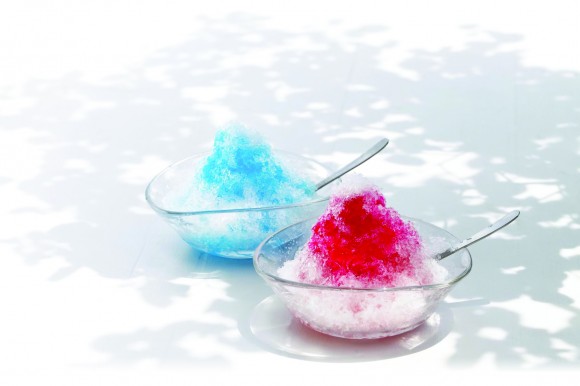Finely shaved ice. Sugary syrup that tastes like pralines or strawberries or pina coladas. Perhaps a trickle of condensed milk and some whipped cream.
The making of a classic New Orleans “sno-ball,” it would seem, is a simple matter — that is, until lawyers get involved.
Allegations of trademark violations and patent infringement have been boiling up in state and federal courts since 2005 in what amounts to a decade-long snoball fight between SnoWizard Inc., which makes ice-shaving machines and flavorings, and rivals including Southern Snow Manufacturing and Snow Ingredients Inc. The companies have battled on a range of issues including patents on machine parts and trademarks for flavor names such as Snosweet, Mountain Maple and Orchid Cream Vanilla.
Signs that the legal frozen food fight may be playing out are in a decision handed down Aug. 15 by the 5th U.S. Circuit Court of Appeals.
The judge sprinkled her ruling with wintry allusions summing up the court skirmishes.
“What began as a flurry of cease-and-desist letters between the companies has turned into a blizzard of patent, trademark, and antitrust litigation,” Judge Jennifer Walker Elrod wrote for a three-judge panel. “Each party has attempted to freeze the other out of the sno-ball market.”
Elrod’s opinion included a recap of claims, counterclaims and overlapping litigation that has played out in multiple court jurisdictions with various results for all involved. It upheld a lower court’s dismissal of a host of the Southern Snow group’s latest claims against SnoWizard. Among them, that some of SnoWizard’s litigation tactics violated racketeering law, that SnoWizard was trying to establish a sno-ball monopoly and that it fraudulently registered the White Chocolate & Chips and Cajun Red Hot trademarks.
SnoWizard, meanwhile, had argued that Southern Snow should be sanctioned for making claims that were frivolous in an attempt to harass SnoWizard. Elrod’s opinion said the panel was upholding the denial of sanctions because, while Southern Snow’s claims were “creative” they weren’t “ridiculous.”
Where the case goes next is unclear. SnoWizard attorney Jack Morris said in an email that the company is happy with the decision and has no plans to appeal; Mark Andrews, an attorney for the Southern Snow clients, said in an email that they are evaluating the case.
Food feuds are nothing new in New Orleans. Litigation and family disagreements nearly killed Brennan’s restaurant in the French Quarter, which has bounced back strong after a temporary closure. A famous diner on the uptown streetcar line, the Camelia Grill, was the subject of trademark disputes when it changed hands after Hurricane Katrina. You can still hear arguments from time to time about which beignet and cafe-au-lait business — Cafe du Monde or Morning Call — has a longer history.
Syrup-flavored ice concoctions have an even longer history.
“It was a practice in Europe with actual snow,” said Liz Williams, director of the Southern Food and Beverage Museum in New Orleans. She also notes stories of American Indians flavoring snow with maple syrup centuries ago.
Manufactured ice was available in New Orleans as early as the 1840s, she said. Sicilian immigrants may have introduced the city to the practice of adding syrup to shaved ice, “which was about as close as you could get to real snow,” she said.
And, while such treats are hardly unique to New Orleans, sno-ball stands are as cherished a part of some neighborhoods as the local po’boy shop. “We embrace them, there’s no question about that, and consider them something that’s part of our culture.”
A fluffier, finer-shaved part of the culture — as acknowledged by Elrod’s ruling: “The products that are the center of this dispute are New Orleans-style sno-balls, not snow cones,” she writes, adding that “a sno-ball is a dessert treat made from finely shaved ice that can be consumed with a straw or spoon while a snow cone is made using coarser crushed ice and is generally eaten directly cone to mouth.”
In addition to food lore and wordplay, Elrod’s opinion includes a suggestion that it’s time for the fight to end.
“The parties could have shaved down the overwhelming costs in time, expense, and scarce judicial resources that this litigation has consumed,” Elrod wrote, “if they could have abandoned their unrelenting desire to crush the opposition.”
Related:
Topics Louisiana
Was this article valuable?
Here are more articles you may enjoy.



 Allstate CEO Wilson Takes on Affordability Issue During Earnings Call
Allstate CEO Wilson Takes on Affordability Issue During Earnings Call  Florida’s Commercial Clearinghouse Bill Stirring Up Concerns for Brokers, Regulators
Florida’s Commercial Clearinghouse Bill Stirring Up Concerns for Brokers, Regulators  Nine-Month 2025 Results Show P/C Underwriting Gain Skyrocketed
Nine-Month 2025 Results Show P/C Underwriting Gain Skyrocketed  What Analysts Are Saying About the 2026 P/C Insurance Market
What Analysts Are Saying About the 2026 P/C Insurance Market 

